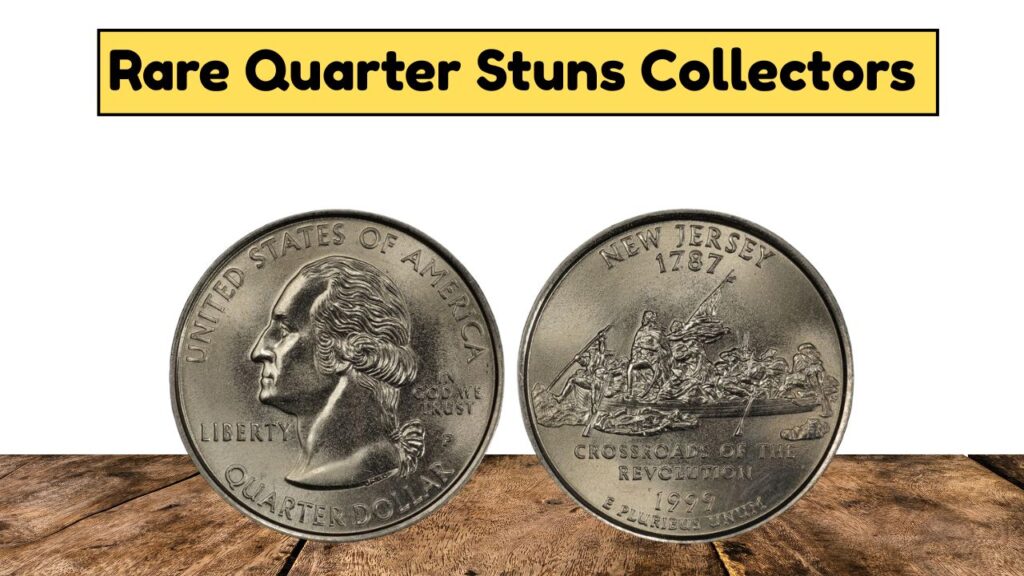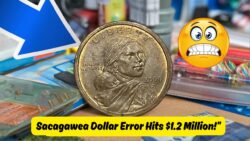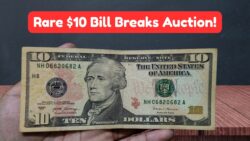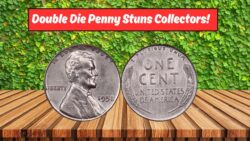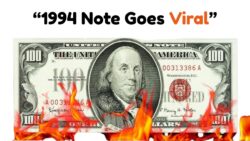Off-Center 1999 Quarter – In the world of coin collecting, rare errors and minting mishaps often lead to astounding values at auction. Recently, an off-center 1999 Washington Quarter shocked collectors and numismatic enthusiasts alike by selling for a whopping $6,300 at a high-profile auction. While it may look like an ordinary piece of pocket change to the untrained eye, this rare error coin is a prized possession for those who know what to look for. This article dives into why this off-center quarter fetched such a high price, what makes it unique, and how you can identify valuable coins like it in your own change. Whether you’re a seasoned coin collector or a curious beginner, understanding the story behind this coin could lead you to uncover hidden treasures in your spare change jar.
Why Did the 1999 Off-Center Quarter Sell for $6,300?
A coin selling for over $6,000 might seem outrageous, especially when its face value is only 25 cents. But there are specific reasons why this quarter drew such a high bid.
- Off-center error: This coin was struck well off its intended position, resulting in a dramatic visual misalignment.
- High grade condition: It was preserved in near-perfect state, graded as Mint State (MS) by a trusted grading authority.
- Low occurrence: Severe off-center errors like this are rare for the 1999 quarter series.
- Strong collector demand: Coins with major minting errors are extremely popular among error coin collectors.
Key Features of the $6,300 Off-Center 1999 Quarter
The auctioned quarter wasn’t just any off-center coin—it had several characteristics that increased its appeal.
| Feature | Description |
|---|---|
| Coin Type | Washington Quarter |
| Year | 1999 |
| Mint Error | 60% Off-Center Strike |
| Grade | Mint State (MS) |
| Mint Mark | None visible due to error |
| Design Visibility | Partial design missing, adding to visual rarity |
| Metal Composition | Copper-Nickel Clad |
| Auction Price | $6,300 |
What Is an Off-Center Error in Coins?
Off-center errors occur when the blank planchet (coin disc) is not properly centered under the coin press dies. This leads to part of the design being struck off the coin’s surface, resulting in a “cut-off” appearance.
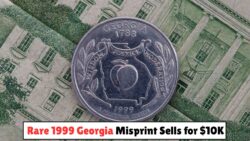 This 1999 Georgia Quarter With Misprint Just Hit $10,000 at Auction – Still in Circulation!
This 1999 Georgia Quarter With Misprint Just Hit $10,000 at Auction – Still in Circulation!
How Off-Center Errors Are Classified:
- 5–10% Off-Center: Minor error, relatively common, low value.
- 15–30% Off-Center: Moderate error, noticeable misalignment.
- 40–60% Off-Center: Major error, high value especially if date is visible.
- Over 60% Off-Center: Very rare; often missing key elements like mint marks or dates.
In this 1999 quarter’s case, the off-center strike was estimated at about 60%, making it highly desirable among collectors.
How Coin Grading Impacts Value in Auctions
Besides the error itself, the grade of a coin plays a massive role in determining its final value at auction. This refers to the coin’s physical condition, measured on a scale from 1 (Poor) to 70 (Perfect Mint State).
Factors That Determine a Coin’s Grade:
- Luster: Shine and brilliance from original minting.
- Strike: Sharpness and detail of the coin design.
- Surface Preservation: Absence of scratches, nicks, and blemishes.
- Eye Appeal: Overall visual attractiveness.
A coin like the 1999 off-center quarter achieving Mint State 65 or higher drastically increases its value. This level of preservation, combined with a significant mint error, is what allowed it to command $6,300.
Other Error Coins That Have Sold for High Prices
The 1999 quarter is not alone—several error coins have stunned the numismatic world by achieving extraordinary auction prices.
| Coin Description | Error Type | Auction Price |
|---|---|---|
| 1955 Doubled Die Lincoln Cent | Doubled Die | $24,000+ |
| 2000-P Sacagawea Dollar / State Quarter Mule | Double denomination | $75,000+ |
| 1983 Washington Quarter | Spitting Eagle Die Clash | $800+ |
| 1970-S Kennedy Half Dollar | 40% Off-Center Strike | $4,000+ |
| 1999 Georgia Quarter | Broadstrike Error | $1,250+ |
These examples show that both modern and old coins can be worth a fortune when mint errors are involved—especially when they’re in excellent condition.
How to Spot Rare Off-Center Coins in Your Change
You don’t need to be a professional numismatist to start hunting for off-center error coins. Here are easy steps to identify them:
Tips to Identify Off-Center Coins:
- Look at the border – Is part of the design missing or cut off?
- Check for visible date – Dates increase value; if missing, some buyers might pay even more.
- Uneven rims – One side may be thick, while another may be thin or missing completely.
- Misshapen appearance – Coin might not be perfectly round.
- Multiple errors – Coins with more than one error (off-center + clipped planchet) can be extra valuable.
If you find a coin that matches any of these characteristics, consider getting it professionally graded.
Should You Sell or Hold Your Off-Center Coin?
This depends on a few key factors:
- Grading: A professionally graded MS coin sells higher.
- Error severity: Greater misalignment = higher price.
- Market timing: When error coins trend, values rise.
- Sentimental value: Some collectors prefer to keep rare finds.
If you’re unsure, consult a coin dealer or submit your coin to a grading service like PCGS or NGC for evaluation.
FAQs of Off-Center 1999 Quarter
Q1. What year was the $6,300 off-center quarter minted?
A1. It was a 1999 Washington Quarter.
Q2. What type of error made the coin so valuable?
A2. A 60% off-center strike error dramatically increased its value.
Q3. Can off-center coins from other years be valuable too?
A3. Yes, especially if the error is severe and the coin is in good condition.
Q4. Where can I sell my error coin?
A4. You can sell through eBay, Heritage Auctions, or local coin dealers.
Q5. Do I need to grade my coin before selling it?
A5. Grading is recommended as it adds credibility and can significantly increase value.

